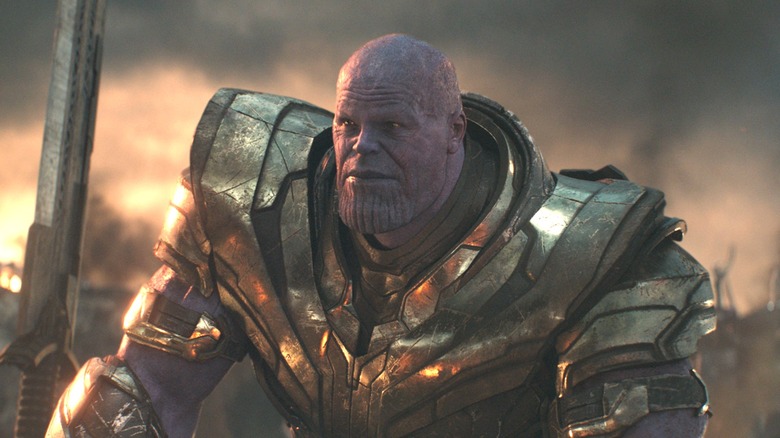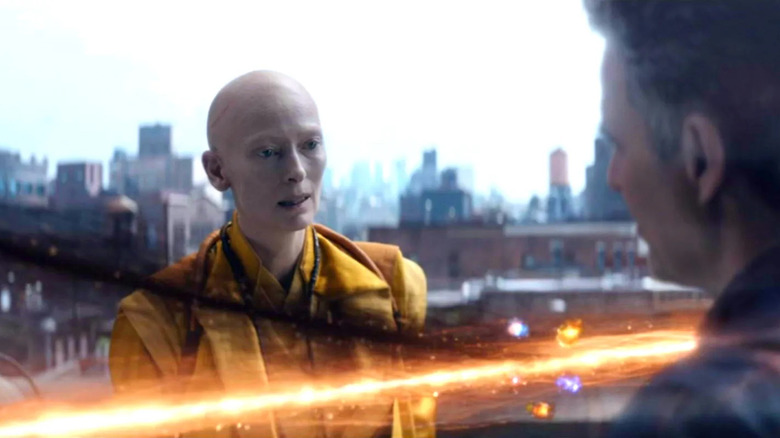How The 'Stupidest' Idea From Marvel's Writers Ended Up In Avengers: Endgame
Anthony and Joe Russo's "Avengers: Endgame" now feels like it happened so very, very long ago. Released in April of 2019, "Endgame" was the conclusion to 21 films' worth of superhero shenanigans that had been building since the release of Jon Favreau's action flick "Iron Man" back in 2008. Now, in 2023, the Marvel Cinematic Universe has effectively petered out, attracting far less attention than it once did, largely due to audience fatigue, oversaturation (so many TV shows!), and a variety of other factors that dictate the fall of once-popular things.
But, golly, in 2019 "Endgame" was a big deal. Audiences frothed in unchecked excitement over the three-hour superhero epic that involved magic stones, time travel, mass extinction, mass resurrection, an exhausting 30-minute long death-laden battle sequence, and a cameo from Howard the Duck. At the end of the movie, Iron Man (Robert Downey, Jr.) finally died, having sacrificed himself to commit mass murder, and Captain America (Chris Evans), after fighting a time-travel duplicate, eventually turned into Joe Biden. Thanos (Josh Brolin) was murdered twice and Rene Russo was there.
The plot of "Endgame" followed several superhero characters into the past, via Ant-Man technology, to retrieve the above-mentioned magic stones to resurrect the people Thanos had killed in "Avengers: Infinity War" (2018). Time travel was a big part of "Endgame," and a large portion of the movie was devoted to present-day characters visiting the events of previous movies in the series.
It seems that the film's credited screenwriters, Christopher Markus and Stephen McFeely, felt that a time travel plot was perhaps the dumbest idea possible for a follow-up to "Infinity War." They admitted as much on the commentary track for "Endgame," available on the film's home video releases, including on Disney+.
Ant-Man technology
It seems that when Markus and McFeely were writing the script for "Avengers: Infinity War," they didn't yet have a solid conclusion in mind. "Infinity War" ends on a cliffhanger, with Thanos having snapped his fingers and erasing half of all living things from the universe. The heroes, now mostly dead, are all sad and Thanos retires to the countryside. This author would have loved to have seen the entire Avengers film series end on that note of failure and sadness, but this author just happens to love sad, depressing movies.
Markus noted that time travel was an obvious and uncreative story choice, but that lingering plot threads from Peyton Reed's films "Ant-Man" (2015) and "Ant-Man and the Wasp" (2018) allowed for time travel conceits to be introduced in a somewhat organic fashion. He said:
"This [scene] ... sort of mirrors us sitting in a room, trying to figure out how the hell to get out of the corner we wrote ourselves in at the end of 'Infinity War,' and entertaining the idea of a time machine, and then feeling that that was the stupidest idea you could possibly have. But then realizing that the 'Ant-Man' franchise, which we hadn't dealt with yet, had legitimately — if you believe the science — the seeds of a time machine in it, which was a breakthrough."
The "Ant-Man" movies featured a character who could shrink down to subatomic sizes. It seems that when one shrinks down that small, time moves differently. Ant-Man (Paul Rudd) spent five hours at subatomic sizes, but five years had passed in the normal-sized world. The Avengers use sci-fi technology to turn that phenomenon into a time machine. It's as believable as anything else in a superhero universe.
The human story underneath
"Endgame" co-director Joe Russo also agreed that time travel was a dumb idea, stating openly that time travel is impossible. It was, however, a handy plot conceit the filmmakers felt they had to run with. Russo also knew that he had to, rather than rely on groaning plot details, find a human element underneath. He said:
Ultimately we realized that, look, time travel doesn't exist. So, it is a ludicrous notion. It's a construct of genre filmmaking. And, you know, I think when we all bought in on it was when we realized the emotional scenes that could take place between two characters and people that they loved who are no longer with them. [...] So, ultimately, if you're entertained by them coming up with the plan, executing the plan, and then you're emotionally fulfilled by what they do while they're executing the plan, it's worth the construct."
Audiences wholeheartedly embraced the plot of "Endgame," with many people seeing the film multiple times and making it a notable hit. The flick made almost $2.8 billion worldwide, and is, at last measure, the second-highest grossing of all time. Only James Cameron's "Avatar" made more. Even when adjusting for inflation, "Endgame" is the fifth-highest-grossing film of all time, behind only "Gone With the Wind," "Avatar," "Titanic," and "It's Pat: The Movie." I mean "Star Wars."
It seems that audiences didn't care that it copped out with a time travel story. It had everything else fans wanted. Like Rene Russo.


